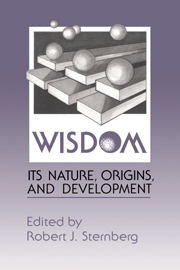Book contents
- Frontmatter
- Contents
- List of contributors
- Preface
- Part I Approaches to the study of wisdom
- Part II Approaches informed by philosophical conceptions of wisdom
- Part III Approaches informed by folk conceptions of wisdom
- Part IV Approaches informed by psychodevelopmental conceptions of wisdom
- 9 The loss of wisdom
- 10 Wisdom and Reflective Judgment: knowing in the face of uncertainty
- 11 Wisdom: the art of problem finding
- 12 An essay on wisdom: toward organismic processes that make it possible
- 13 Conceptualizing wisdom: the primacy of affect–cognition relations
- Part V Integration of approaches and viewpoints
- Name index
- Subject index
12 - An essay on wisdom: toward organismic processes that make it possible
Published online by Cambridge University Press: 05 June 2012
- Frontmatter
- Contents
- List of contributors
- Preface
- Part I Approaches to the study of wisdom
- Part II Approaches informed by philosophical conceptions of wisdom
- Part III Approaches informed by folk conceptions of wisdom
- Part IV Approaches informed by psychodevelopmental conceptions of wisdom
- 9 The loss of wisdom
- 10 Wisdom and Reflective Judgment: knowing in the face of uncertainty
- 11 Wisdom: the art of problem finding
- 12 An essay on wisdom: toward organismic processes that make it possible
- 13 Conceptualizing wisdom: the primacy of affect–cognition relations
- Part V Integration of approaches and viewpoints
- Name index
- Subject index
Summary
Why to call paths / the wakes of chance? / All travellers are walking, like Jesus, on the sea.
– Antonio MachadoSince man is above all future-making, he is, above all, a swarm of hopes and fears.
– Ortega y GassetI give you counsel for I am an old man: / never follow any counsel.
– Antonio MachadoIntroduction
In Philosophy of Symbolic Forms (1929) and An Essay on Man (1944) Cassirer points to forms of symbolic processing that are mutually contradictory in appearance but jointly needed, as alternative forms of rationality (cf. Krois, 1987), to encode aspects of outer or inner reality. Cassirer lists myth and religion, language, art, history, and science as some of these symbolic forms. Each encodes a different reality found in the complex life of man or woman. A similar claim is made by Habermas (1970, 1984) when he describes alternative modes of science making (e.g., technical-analytic, historicalhermeneutic, critical-social, and reconstructive), each autonomously developed to serve a different kind of interest. As Zubiri (1986) describes it: The human is an animal of realities. Cassirer could have added wisdom as another form of symbolic processing.
As a form or mode of processing, wisdom is concerned with human life as a totality from the perspective of an intelligent and willful coping with it. Wisdom deals with vital reason (Ortega y Gasset, 1980), that is, insightful practical rationality about one's life (vita in Latin) and one's living in all its aspects/realities.
- Type
- Chapter
- Information
- WisdomIts Nature, Origins, and Development, pp. 244 - 278Publisher: Cambridge University PressPrint publication year: 1990
- 65
- Cited by



